

www.robbiebankes.com
Songs That Made History: "Geordie" is Child ballad 209 (Roud 90), existing in many variants. Versions of the ballad have been sung by traditional folk singers in Scotland, England, Ireland, Canada and the USA, and performed and recorded by folk artistes and groups. The ballad concerns the trial of the eponymous hero, during which his wife pleads for his life.


There are two distinct and for the most part separate variants of this song, one deriving from seventeenth century English broadsides and sung by traditional singers in England, Ireland and North America, the other printed in one eighteenth and some nineteenth century ballad collections and collected from Scottish singers and some North American singers.
Steve Roud and Julia Bishop (New Penguin Book of English Folk Songs) comment that in Scottish versions Geordie tends to be released, while in English ones his lady "has "come too late" and he is executed.
A man is killed in battle and Geordie is to be executed. When his lady hears of this she calls for horses to ride with her household to the court in Edinburgh, sometimes by way of Queensferry, where sometimes she has her horse swim the Firth of Forth. Sometimes she distributes gold to poor people as she goes. Arriving in the town, she sees her husband being brought to the headsman's block. She begs the king for Geordie's life, offering estates and her children in return, but the king orders the hangman to make haste. Sometimes there is discussion about Geordie's fate between lords. Sometimes men of the Gordon clan show readiness to fight. An old man suggests the king accept money for Geordie's release, and a large and sufficient sum is gathered from the crowd. He is released and the couple say complimentary things.
A narrator coming (usually) over London Bridge (but sometimes elsewhere) hears a young woman lamenting for Geordie. She says he will be hung in style because he was of royal blood and loved a good woman. She calls for horses to ride to London (or somewhere else). She pleads that Geordie's crimes weren't serious, in that he only stole some of the king's deer and sold them (in Bohenny, Davy, Kilkenny and so on), and says she would give up a variable number of children to save his life. In some versions there is discussion between lawyers. The judge sometimes says that she's too late and always that he cannot pardon Geordie. Sometimes Geordie has time to say goodbye to his friends and his wife. Sometimes one or the other wishes he or she were on "yonder Hill" with weapons to "Fight for the life of Geordie". Often we hear again that his execution will be luxurious.
|
|
There was a battle in the north, |
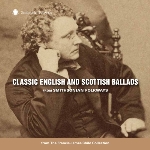
The earliest known publication of a variant of this song is a London black-letter broadside "The Life and Death of George of Oxford" dating from between 1672 and 1696, though an earlier broadside from between 1601 and 1640, 'A lamentable new ditty, made vpon the death of a worthy gentleman, named George Stoole : dwelling sometime on Gate-side Moore, and sometime at Newcastle in Northumberland: with his penitent end. To a delicate Scottish tune' has "a rhythm and rhyming scheme that connects it to "Geordie", and includes some key verbal similarities, such as the lines
I never stole no oxe nor cow
Nor never murdered any"
Robert Burns contributed a version of the Scottish variant to Scots Musical Museum, published in Volume 4 in 1792. This is Child's version A.
The English variant was published by many broadside publishers in the nineteenth century CE.
My Georgie never killed a man,
No, nor neither robbed a lady.
He stole a pair of the King’s pretty maids,
And he gave them to Lord Taily.
The Roud Folk Song Index lists about 129 distinct versions - 40 from England, 27 from Scotland, 2 from Ireland, 52 from the USA and 8 from Canada.
One of the earliest recorded versions is by Joan Baez, who included a live performance of the song on her first live album in 1962. The Baez version makes it clear that Geordie's crime was poaching the King's deer, for which the penalty was hanging with a silken rope. It has also been recorded by Ewan MacColl, John Jacob Niles, Doc Watson, Sandy Denny, A. L. Lloyd, Julie Felix, and the British folk rock band Trees, Silly Sisters and Shirley Collins. More recently, Emilie Autumn performed it live.
The ballad became very popular in Italy thanks to Fabrizio de André who translated the ballad into Italian, and this version was later reinterpreted by the folk band Mercanti di Liquore, Angelo Branduardi and the DJ Gabry Ponte.
In September 1965, the ballad was adapted in French by Claude François on his EP "Dona Dona".
Danish band Gasolin recorded an adaptation in 1971 heavily inspired by Baez' rendition. "London Bridge" was translated into "Langebro" - the title of the track. The setting shifts from London to 20th century Copenhagen, though the overall sombre mood of the song remains intact.
Anaïs Mitchell and Jefferson Hamer perform this song on Child Ballads, released in 2013.
It was also performed by the Russian folk band Sherwood.
In 2015 Galley Beggar recorded a version of Geordie for their album Silence & Tears, with the traditional lyrics being set to original music.

In terms of geography, there are four versions. The Scottish variants mention Geordie being rescued from the scaffold in Edinburgh. This may refer to George Gordon, 4th Earl of Huntly. One English version mentions Newcastle. This may refer to George Stools, executed in 1610. There are some versions that mention the town "Boheny", but this has never been satisfactorily located. There is a hamlet called Bohenie near Roybridge. Another English version has the execution taking place in London, and the culprit is the Earl of Oxford. The story of the Earl of Oxford was printed in the seventeenth century. The last version is the Danish version taking place in Copenhagen, performed by Gasolin. The Danish title is Langebro.
The relationship between the two main variants of this ballad are uncertain.
"The propriety of the inclusion of Georgie in this recorded series of Child ballads is largely dependent upon the acceptance or rejection of various claims of prior existence of several different ballad strains. The ballads in question are a traditional Scottish ballad, the earliest known version dating from the end of the 18th century, and two English broadsides, both of which date from the 17th century. Child (and most later scholars) believed that the Scottish ballad must have existed prior to the broadsides and that the broadside scriveners borrowed from the Scottish ballad. As evidence, Child indicated that the broadsides are merely “goodnights”, while the Scottish texts are full narratives, with a beginning, middle and end. Ebsworth, however, was of the opinion that the broadsides were the earlier form, and that the Scottish ballad was an adaption from these.
Most texts collected since Child (including the version sung here by A.L. Lloyd) are obviously derived from 19th century broadside printings of the early English broadsides in question. Indeed, aside from some few texts from Scotland, all of the many recently reported texts are at least partly derived from the English broadsides."
A L Lloyd commented:
"As with many of our best ballads, this one is familiar both in England and in Scotland. In the latter, the main character usually appears as a nobleman sometimes identified as George Gordon, a sixteenth century Earl of Huntly, whereas in England he is usually a common outlaw thought by some to be George Stoole, a Northumbrian robber executed in 1610. In fact, there are not good grounds for presuming that this is a historical ballad at all; it may well be simply a romantic fiction that was already delighting singers and audiences well before the day of the robber Stoole or the dissident Earl of Huntly. Perhaps the story really belongs to the period when the Middle Ages were drawing to a close and the greenwoods were full of outlaws, some high-born, but mostly otherwise, all of them on the run from oppressive feudal authority."

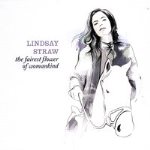 www.lindsaystraw.com |
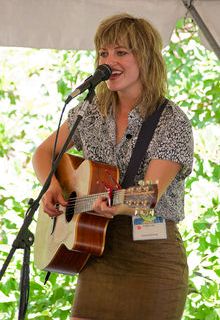
 "Geordie"; from: Anaïs Mitchell & Jefferson Hamer, "Child Ballads", Wilderland Records, 2013 anaismitchell.com |
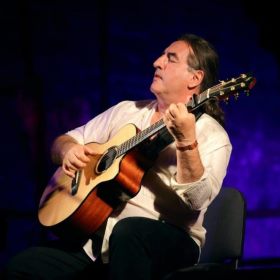
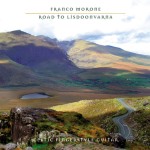 www.francomorone.com |

Listen to Geordie from: Peter Bellamy, Martin Carthy, James Findlay, The Green House Band, Peter Kerlin, The Maerlock, Franco Morone, Ravenheart, WilloS'
Watch Geordie from: Joan Baez, Robbie Bankes, Black Irish Band, Martin Carthy, Fabrizio De Andrè, Lindsay Straw, Anaïs Mitchell, Doc Watson

Text is available under the Creative Commons Attribution-ShareAlike License.
Date: October 2017.
Photo Credits:
(1) Robbie Bankes,
(2) "Classic English and Scottish Ballads from Smithsonian Folkways (from The Francis James Child Collection)",
(3) Iron Mountain String Band,
(4) Julia Bishop, Steve Roud "The New Penguin Book of English Folk Songs",
(5) Lindsay Straw,
(6) Anaïs Mitchell,
(7) Franco Morone,
(8) "Geordie"
(unknown/website).